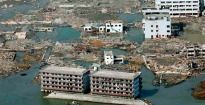Quake Could Cost Japan $200B
Japan's devastating earthquake and deepening nuclear crisis could result in losses of up to $200 billion for the world's third largest economy but the global impact remains hard to gauge five days after a massive tsunami battered the northeast coast.
As Japanese officials scrambled to avert a catastrophic meltdown at a nuclear plant 240 km (150 miles) north of the capital Tokyo, economists took stock of the damage to buildings, production and consumer activity.
The disaster is expected to hit Japanese output sharply over the coming months, but economists warned it could result in a deeper slowdown if power shortages prove significant and prolonged, delaying or even scotching the "v-shaped" recovery that followed the 1995 Kobe earthquake.
Most believe the direct economic hit will total between 10-16 trillion yen ($125-$200 billion), resulting in a contraction in second quarter gross domestic product (GDP) but a sharp rebound in the latter half of 2011 as reconstruction investment boosts growth.
"The economic cost of the disaster will be large," economists at JP Morgan said. "There has been substantial loss to economic resources, and economic activity will be impeded by infrastructure damages (like power outages) in the weeks or months ahead."
Japanese stocks suffered their worst two-day rout since the 1987 crash on Monday and Tuesday, losing a whopping $626 billion in value, before rebounding 5.7 percent on Wednesday as hedge funds rushed to cover short positions.
But traders remained skittish, swayed by each new development at the stricken Fukushima power plant and alert to signs Japanese companies and insurers could sell sizeable foreign assets and repatriate funds to cover the costs of the nuclear crisis, quake and tsunami.
High-yield bonds and U.S. Treasuries top the list of vulnerable assets should the triple disaster of earthquake, tsunami and nuclear breakdown prompt Japanese investors to bring overseas funds back home, analysts say.
Although the damage to infrastructure has been severe, some of the biggest risks to the economy may come from indirect market consequences of the disaster, such as a rise in the Japanese yen.
The yen surged to an all-time high against the dollar after the Kobe earthquake in 1995 as Japanese firms pulled funds home. The dollar has fallen 3 percent against the yen since the disaster and is now close to the low hit after Kobe.
The direction of the yen could have a big impact on Japanese carmakers like Toyota Motor Co, Nissan Motor and Honda Motor, which build between 22 and 38 percent of their cars at home.
HSBC Chief Economist Stephen King said it was still too early to put a figure on the economic costs as the scale of the disaster was not yet clear.
The area of Japan affected by the tsunami produces around 4.1 percent of the country's GDP, suggesting first-round economic effects could be limited, he said. But with the fate of the Fukushima nuclear reactors still unclear, Japan may not have felt the full force of the disaster yet.
"At this stage, it's too early to come up with meaningful estimates of the overall impact of the terrible events in Japan," King wrote in a research note.
"Knee-jerk economic and financial reactions to shocks and disasters often fall wide of the mark," he noted, pointing to erroneous predictions of a U.S. recession following the September 11, 2001 attacks and of a major hit from the 2004 Asian tsunami.
The disaster is already disrupting the global manufacturing chain, hitting technology companies particularly hard as Japan accounts for one-fifth of the world's semiconductor output.
However, reflecting the high degree of uncertainty about the global economic impact of the disaster, the U.S. Federal Reserve made no mention of Japan in a statement issued after its policy meeting on Tuesday.
Click here to read more.


